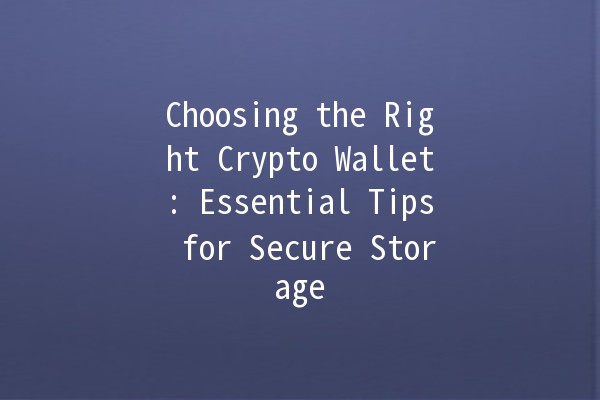




As the world of cryptocurrency continues to grow, the importance of choosing the right crypto wallet has never been more crucial. With numerous wallets available—each offering different features, security levels, and usability—making an informed decision can significantly affect the safety of your digital assets. This article dives deep into the world of crypto wallets, outlining essential tips to guide you through the selection process.

Before we discuss the tips for choosing a wallet, it's essential to understand the different types of wallets available:
When choosing a crypto wallet, evaluating your security requirements is the first step. Here are some considerations:
Amount of Crypto: How much cryptocurrency do you hold or plan to hold? Larger amounts warrant more secure solutions.
Transaction Frequency: If you trade frequently, a hot wallet might be more convenient, but you should balance convenience with security.
Security Features: Look for wallets with strong security features, including twofactor authentication (2FA), multisignature support, and backup options.
If you are a longterm holder (HODLer) with a substantial amount of crypto, a hardware wallet such as Trezor or Ledger Nano would be advisable due to their enhanced security.
A wallet should be userfriendly, and the interface should be intuitive, especially if you are new to cryptocurrency. An excellent user experience can simplify managing your assets, making transactions smoother.
Interface Design: Look for a clean and simple layout.
Support and Resources: Check if the wallet provides good customer support, tutorials, and FAQs.
Choosing a mobile wallet with a straightforward interface, such as Trust Wallet or Exodus, could enhance your experience, especially if you transact on your phone frequently.
Not all wallets support every type of cryptocurrency. Make sure the wallet can accommodate all the cryptocurrencies you plan to store or trade.
Variety of Coins: If you deal in multiple cryptocurrencies, opt for a multicurrency wallet.
Integration with Exchanges: Some wallets offer easy trading integration with exchanges, which can streamline your experience.
If you plan to trade Bitcoin, Ethereum, and a few altcoins, a wallet like Atomic Wallet could be ideal as it supports a wide variety of assets along with exchange functionalities.
Before making a decision, researching the wallet's reputation is essential. Look for user reviews, expert opinions, and discussions in cryptocurrency forums.
Community Feedback: Engaging in crypto communities can provide insights into how secure and reliable different wallets are.
Trustworthiness: Ensure the wallet has been around for a while and hasn’t suffered any significant security breaches.
Using platforms like Reddit or Trustpilot can provide user experiences and highlight any issues with specific wallets.
While many wallets are available for free, some premium options offer advanced features that might justify their costs. Evaluate whether the pricing fits your needs and expectations.
CostBenefit Analysis: Determine if the features offered by a paid wallet outweigh the initial costs.
Hidden Fees: Review if the wallet charges for transactions, withdrawals, or other services.
If you find a wallet that charges a small fee but offers robust security and features, it might be worth the investment compared to using a free wallet with lesserproven security measures.
The safest type of crypto wallet is generally a cold wallet, such as a hardware wallet. Since these wallets store your assets offline, they are less vulnerable to online threats. However, users must manage the physical security of the hardware.
To enhance the security of your crypto wallet, enable twofactor authentication (2FA) if available. Regularly update your software, use strong, unique passwords, and be cautious of phishing attempts.
Yes, you can transfer your crypto assets between different wallets. However, ensure the receiving wallet supports the same cryptocurrencies you want to transfer.
Yes, many cryptocurrency investors use multiple wallets for different purposes—hot wallets for daily transactions and cold wallets for storing larger amounts securely. This method can provide a balanced approach to convenience and security.
If you lose access to your crypto wallet, recovery depends on the wallet type. Most wallets provide a recovery phrase or seed phrase when you first set them up. Keeping this phrase secure is critical for regaining access.
Generally, web wallets are not recommended for longterm storage due to their connection to the internet, making them more susceptible to hacking. For longterm storage, consider using a cold wallet (hardware wallet).
When deciding on a crypto wallet, ensure to keep yourself uptodate with the latest security practices and wallet developments. The crypto space evolves rapidly, and staying informed will help you maintain the security of your investments.
Choosing the right crypto wallet involves several steps, from assessing your security needs and evaluating user experience to ensuring compatibility with your preferred cryptocurrencies. By considering the essential tips and techniques outlined in this article, you can make an informed decision and protect your digital assets effectively. Stay vigilant, and take the necessary precautions to secure your cryptocurrency investments.
This article provides a comprehensive overview of choosing the right crypto wallet while offering practical tips, user experiences, and security measures to enhance your cryptocurrency journey.